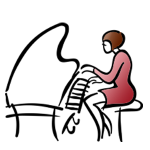NaBloPoMo Day 7!
Yesterday I recounted the story of a defining moment in my musical education, when I learned that classical composition didn’t end with the dawn of the 20th century. (I wonder what my life would’ve been like if I’d learned this earlier — then again, I was enough of a geek in high school as it was… 😉 )
Anyway, my assimilation into the Bartók borg had a dual effect: 1) it opened me up to a wealth of music that I would have avoided otherwise, and 2) it planted the seed of my own compositional curiosity. I had written a couple of pieces in high school — an imitation of a Chopin nocturne and an imitation of a Renaissance madrigal — but I didn’t really consider myself a composer. I just wanted to play the piano; I hadn’t given much thought to other avenues.
I figured, so much good music had already been written — who was I to think I might have anything worthwhile to add?
But I am a naturally curious person, so when my friends signed up for the Introduction to Composition course during 3rd year of college, I decided to take it too, just to see what it was like. Besides, my other options were counterpoint or conducting; counterpoint seemed stuffy and anachronistic to me, and conducting didn’t appeal to me because I was too shy to stand in front of a group of people and tell them what to do. (Things have changed! 😛 )
Our professor (Jorge Liederman, who died tragically in February of this year) gave us a series of composition assignments with fairly strict rules. I didn’t mind the rules as much as some of my classmates; those who already thought of themselves as composers were affronted by the idea of having limits placed on their creativity, 😛 but I looked at it as a sort of game, like a musical crossword puzzle or something.
But then I got my first fix. 😉
Midway through the semester, the class recruited some volunteer performers and put on a mini-concert of pieces we had written. Hearing my little solo clarinet piece played in front of an audience was another life-changing experience. I was no longer concerned with whether it had all been done before — it was new to me, and I wanted more of it. My composition professor the following year, Andrew Imbrie (R.I.P.), affirmed my experience — he also said that having a piece performed is addictive for a composer. I don’t know if we composers would stick with it otherwise, because, let’s be honest — you sure don’t do it for the money! 😉
Anyway, that was the start of a career path that I could not have imagined previously. (It’s still a challenge sometimes! 😉 ) I still played the piano — I loved that, and always will. But composition suited me temperamentally, with its cerebral, intellectual — heck, nerdy! 😀 aspect. I was too much of a thinker to be content practicing 8 hours a day and focusing only on performing, like a prize-winning racehorse. I’m built for comfort, not for speed! 😉
Well, there’s a lot more to say about all this, but this is today’s bite of the elephant. I’ll just leave you with one last professor story — Jack Swack, the one responsible for my initial conversion, was unfazed when he encountered resistance to his musical mind-opening schemes. A student lodged the following complaint about a difficult modern piece he laid on us:
But I don’t understand it!”
His response was pointed and irrefutable:
Do you think you understand Beethoven?”
No sir — thank you sir! 😛
The End! 😉

If you enjoyed this post, would you consider…
Thanks — you make the world a better place! 🙂



